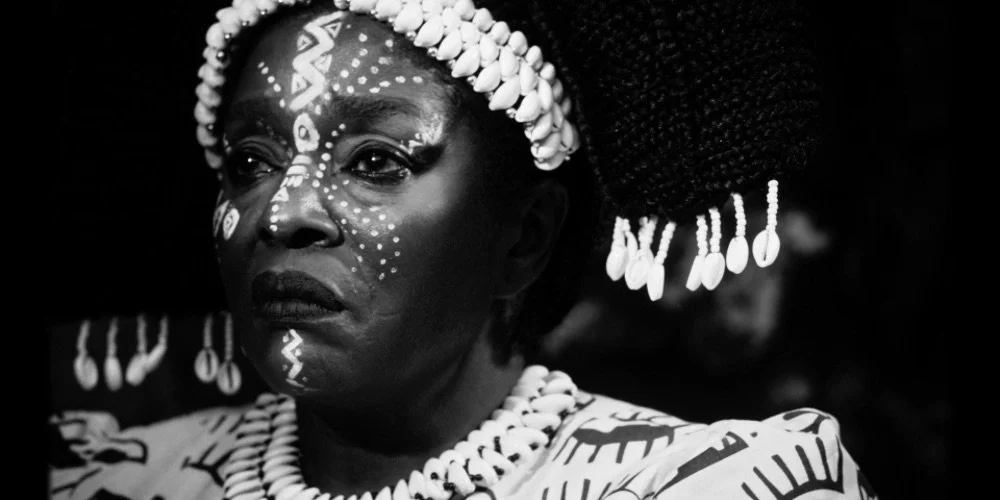'Mami Wata' Review: An Age-Old Water Deity Delivers Tides of Change in This Captivating West African Folk Tale
Courtesy of Dekanalog.
For hundreds of years, Mami Wata –– Mother Water –– has made appearances in the spiritual practices across African cultures and those of the African diaspora. A spirit of oceans, rivers, and the like, Mami Wata has been represented in lore as a mermaid-like figure, ravishing yet dangerous, a guardian of the peace for her loyal devotees. Nigerian filmmaker C.J. 'Fiery' Obasi's latest movie, Mami Wata, utilizes the deity as an approach through which he examines the eternal clash between tradition and modernity, focusing on a West African seaside village in jeopardy when its inhabitants begin to question the power of their water spirit protector. Combining timeless existential obstacles in its narrative with expressionistic and unparalleled black-and-white imagery, Mami Wata is a captivating work of cinema that represents Obasi's invigorating perspective as a filmmaker.
In the village of Iyi, day-to-day life is perpetually shaped by the ocean, by what its energy gives and takes away. Mama Efe, played by Rita Edochie, serves as the matriarch of Iyi, the intermediary between the sea-dwelling Mami Wata and the mortal world. Iyi is upheld by Mama Efe with tradition, unfailingly gathering offerings from the villagers for Mami Wata. However, her followers are increasingly becoming frustrated by the lack of modern progress in their community, which is absent of paved roads, hospitals, and schools. Mama Efe's daughter Zinwe (Uzoamaka Aniunoh) and loyal follower Prisca (Evelyne Ily Juhen) have more contemporary views of the world and urge their leader to change. When a man called Jasper mysteriously washes ashore in Iyi, the equilibrium of their society is thrown off kilter for material promises that deceivingly morph into violent upheaval.
Courtesy of Dekanalog.
Transforming from a family drama to a revenge tale full of folkloric elements from start to finish, Mami Wata's chimeric structure makes it feel like a work that overreaches both the past and the future, which is heightened by the movie's deliberate craft. The dramaturgy of the film's conflict works with hyper-focused attention to the textures and emotions that make up the village, creating an experience that is both culturally specific and referential to any captivating (or cautionary) folk tale. A push and pull between upholding customs and accepting change is ever present in Obasi's screenplay, presenting a nuanced perspective on the grey areas in the Western World's spectral influence over Africa.
The male figures in Iyi present a destabilizing point of view of Mama Efe's matriarchal authority and, in turn, the force of Mami Wata; they are the ones who push the community to question their traditions. Serving as a disruptor to the harmony of society, Jasper's enigmatic presence invites violence into the village, influenced by his lust for power. Mami Wata's effect over the community subverts Jasper's power moves, even though they intriguingly derive from similar sources of economic focus. Mami Wata became prominent during the high time of the Atlantic slave trade, the scars of which still exist in West Africa –– Mami Wata is predominantly in pidgin English, the language historically used for trade in the region.
Courtesy of Dekanalog.
The audio-visual experience presented in Mami Wata pushes the film into the territory of stimulating, unparalleled cinema. Coined in the movie's press notes as a "folk-futurist" style, Mami Wata's cinematographer, Lílis Soares, utilizes wildly contrasting black and white imagery to enhance the movie's eternal qualities. Scenes are often propelled forward visually by the additions of intense out-of-frame lighting, giving the film a sensational look that accentuates every face, leaf, and rushing wave shown on screen. The art direction behind the graphic makeup and intricate textures and materials of clothing (literally) shines with magnificence thanks to Soarces' photography. Not to be overlooked is composer Tunde Jegede's dynamic score, which oscillates from contemporary dance tunes in the film's lightest moments into sounds of foreboding and tension-ratcheting battle marches in its most intense scenes.
Breaching barriers in its visual and narrative language, Mami Wata is the type of film that transcends the typical blockbuster and awards fodder dominating the box office this time of year, presenting a hyper-focus on a culture and its spirituality with many intellectual facets of consideration. Obasi's unique direction proves that he is a filmmaker to keep an eye on, one fully capable of presenting original ideas and perspectives. After premiering at Sundance earlier this year, where it received the Special Jury Award for Best Cinematography, Mami Wata made its way across the festival circuit before earning a record-breaking twelve nominations at the upcoming Africa Movie Academy Awards, including Best Film, Director, and Screenplay. Mami Wata will be distributed by Dekanalog in the United States, making its way into theaters on Friday, September 29.
4.5/5
For more information on Mami Wata or to find a screening near you, visit the movie's official web page.


